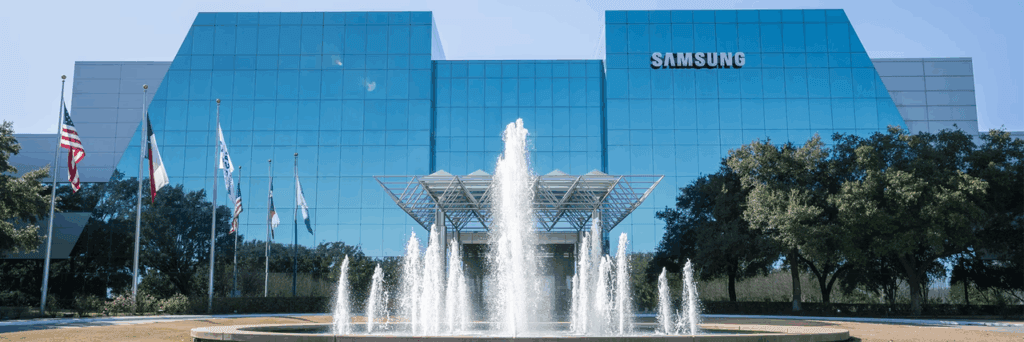August 8, 2025
SEOUL – Samsung Electronics is set to produce chips for Apple’s iPhone at its US fabrication plant, marking a rare partnership between the smartphone archrivals and raising hopes for a rebound in Samsung’s loss-making logic chip business.
Apple revealed Wednesday that Samsung will manufacture the chips at its plant in Austin, Texas, which will be used to optimize performance for its flagship iPhones.
“Apple is also working with Samsung at its fab in Austin, Texas, to launch an innovative new technology for making chips, which has never been used before anywhere in the world,” Apple said in a statement.
“By bringing this technology to the US first, this facility will supply chips that optimize the power and performance of Apple products, including iPhone devices shipped all over the world.”
The unexpected collaboration is part of Apple’s latest investment under its American Manufacturing Program, bringing its total commitment to $600 billion over the next four years to bolster supply chain resilience and advanced manufacturing in the US.
Samsung declined to comment on the partnership, but industry experts expect the company to supply image sensors for future iPhone cameras.
Park Yu-ak, an analyst at Kiwoom Securities, wrote in a July report that Samsung’s semiconductor division is expected to narrow its operating losses by beginning mass production of image sensors for Apple’s iPhone 18 next year and securing new clients such as Tesla.
Samsung’s System LSI division, which oversees logic chips, produces CMOS image sensors under the ISOCELL brand. The company currently supplies the sensors to its Galaxy smartphones, as well as to China’s Xiaomi, Vivo, and Motorola.
Apple has so far sourced all image sensors for its iPhones from Japan’s Sony. The new partnership with Samsung is seen as an effort to diversify its supply chain.
With Apple shipping over 200 million iPhones annually, Samsung is expected to narrow the gap with Sony, the global leader in the image sensor market. Last year, Sony held a 51.6 percent market share — largely due to its supply deal with Apple — while Samsung followed with 15.4 percent and China’s OmniVision with 11.9 percent.
The deal with Apple, following Samsung’s recent $16.5 billion chip supply agreement with US electric vehicle maker Tesla, is also expected to boost prospects for a turnaround in the company’s struggling System LSI and foundry divisions.
In the second quarter this year, Samsung’s logic chip and foundry divisions are estimated to have posted an operating loss in the high 2-trillion-won ($1.4 billion) range.
The System LSI unit has struggled with sluggish adoption of its in-house application processor for smartphones, the Exynos, as well as stagnant market share in image sensors. The foundry unit has continued to post losses due to yield issues and order declines.
According to market tracker Omdia, the global CMOS image sensor market is projected to grow from $20.8 billion in 2024 to $26.5 billion by 2029.
“Profit visibility for Samsung Electronics is improving heading into next year,” said Kim Kyoung-been, an analyst at Samsung Securities. “The flagship adoption of the Exynos 2600 and the foundry business’s turnaround are expected to drive greater earnings momentum in 2026.”
On the latest partnership, experts view the companies’ strategic interests as aligned, particularly in light of growing trade pressure from the US.
Apple, which currently produces around 90 percent of its products in China, has faced increasing pressure under the Trump administration’s reciprocal tariff policies. In response, the company is expanding domestic production to reduce supply chain risks.
Samsung is also under pressure to expand production in the US to avoid potential tariffs on semiconductors. At a White House event Wednesday, US President Donald Trump announced plans to impose a 100 percent itemized tariff on all chips, while offering exemptions for companies that manufacture in the US or commit to doing so.
herim@heraldcorp.com







